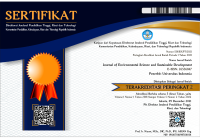Abstract
The universal health social security program in Indonesia began in 2014, and as of the present day, many people are now covered by it. However, many weaknesses in the system have been pointed out. Significantly, many people do not possess the necessary health cards to take advantage of the program due to the complicated process one must go through in order to obtain them. Even now, 60 million people have not joined the program. Many people do not rely solely on the universal social security program but may be supported primarily or additionally by the vernacular care system, whereby support is provided by their family, friends and community. This study intends to understand and analyze the vernacular care system found in rural West Java, Indonesia, with particular focus being given to the elderly’s engagement with it. This study is mainly based on field work that surveyed 64 households with a socio-economic household survey being conducted alongside in-depth interviews with elderly people who received medical check-ups in 2003. This study shows the importance of care; not only that which is provided by the children of elderly parents, but also the grandchildren. In cases where children migrate from their family homes, elderly family members are supported not only through remittance, but also by having their grandchildren live with them. Otherwise, the characteristics of the informal sector occupations enable people to continue living in and around the village that their families are based so that their children, children-in-law, and grandchildren can care for the elderly.
Recommended Citation
Mizuno, Kosuke; Wahyuni, Ekawati Sri; Wada, Taizo; and Matsubayashi, Kozo
(2018).
THE WELFARE OF ELDERLY PEOPLE IN RURAL WEST JAVA: ECONOMY, HEALTH AND VERNACULAR CARE.
Journal of Environmental Science and Sustainable Development, 1(1), 100-115.
Available at: https://doi.org/10.7454/jessd.v1i1.9





